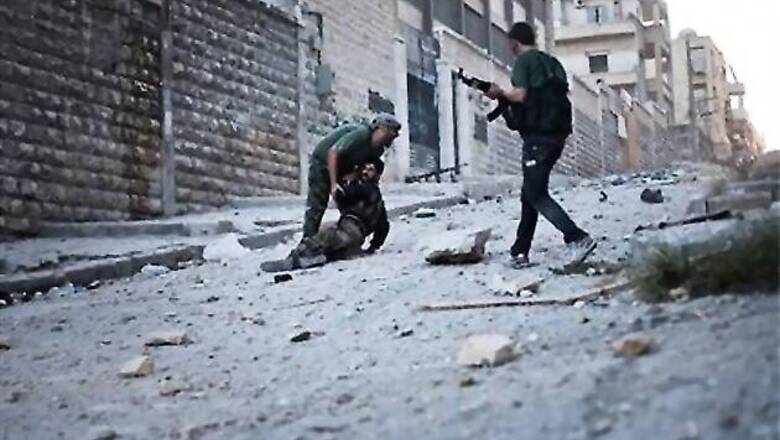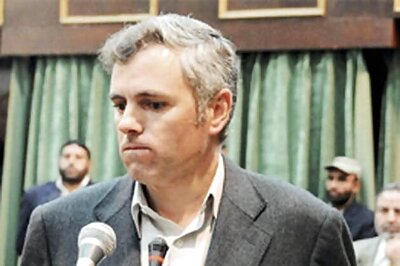
views
Amman: A car bomb ripped through Syria's largest city of Aleppo on Sunday, killing at least 17 people and wounding 40 in one of the main battlegrounds of the country's civil war, state-run media said.
Al-Qaida-style bombings have become increasingly common in Syria, and Western officials say there is little doubt that Islamist extremists, some associated with the terror network, have made inroads in the country as instability has spread. But the main fighting force looking to oust President Bashar Assad is the Free Syrian Army, a group made up largely of defected Syrian soldiers.
Sunday's blast came hours after a Jordanian militant leader linked to al-Qaida warned that his extremist group will launch "deadly attacks" to help the rebels in Syria topple Assad.
In a speech delivered to a crowd of nearly 200 followers protesting outside the prime minister's office in Amman, Mohammad al-Shalabi, better known as Abu Sayyaf, told Assad that "our fighters are coming to get you."
The warning fueled concern that Syria's civil war is providing a new forum for foreign jihadists, who fought alongside Iraqi Sunni insurgents after the 2003 invasion of Iraq and are sending fighters to help the Taliban in Afghanistan.
A Jordan-based Western diplomat who monitors Syria from his base in Jordan said the number of foreign fighters is about 100 but that figure is gradually rising. He spoke on condition of anonymity, saying identifying him further could risk his ability to gather information on Syria.
"From this podium, we declare jihad (holy war) against the wicked Assad, who is shedding the blood of our Sunni Muslim brothers in Syria," Abu Sayyaf yelled through a loudspeaker.
Abu Sayyaf is the head of Jordan's Salafi Jihadi group, which was blamed for the 2002 assassination of U.S. aid worker Laurence Foley outside his Amman home. He himself was convicted in 2004 of plotting attacks on Jordanian air bases hosting American trainers but served his term and was released last year.
The fight for Aleppo, a city of 3 million that was once a bastion of support for President Bashar Assad, is critical for both the regime and the opposition. Its fall would give the opposition a major strategic victory with a stronghold in the north near the Turkish border. A rebel defeat, at the very least, would buy Assad more time.
State-run TV aired footage of fire trucks trying to extinguish the blaze and rescue workers digging through mounds of rubble left by the car bomb. Aleppo's governor, Mohammed Wahid Akkad, was quoted by Syria's official news agency, SANA, as saying 17 dead were civilians.
No group immediately claimed responsibility for the attack. SANA blamed terrorists, the term the regime uses for rebels. Opposition activists could not immediately be reached for comment.
Fighting also raged elsewhere in Syria, with at least 58 people reported killed and scores wounded, according to the Syrian Observatory for Human Rights - a Britain-based monitoring group. That figure excluded the car bomb but included eight killed in an air raid earlier in Aleppo that flattened a residential building, the group said.
The Free Syrian Army said the strikes came hours after rebels overran army barracks in the Hananu neighborhood.
The Syrian conflict has its roots in mostly peaceful street protests that started in March last year. Since then, it has expanded into a civil war, with 23,000 people killed so far, according to human rights activists.
Most rebel leaders deny outright that foreigners are among their ranks. Others say foreigners have only a limited presence.
Still, as the battle grinds on, observers have noticed increasingly sectarian overtones to some of the violence, suggesting any power vacuum will usher in a bloodbath pitting Syria's majority Sunni population against the Assad family's minority Alawite sect, which is an offshoot of Shiite Islam.
Syria's rebels enjoy widespread sympathy across Sunni Arab countries.
On the diplomatic front, Syrian Foreign Ministry spokesman Jihad Makdessi criticized France, saying its growing support for the opposition does nothing but hinder the mission of the new U.N.-Arab League envoy, Lakhdar Brahimi, who is tasked with brokering a diplomatic solution to the conflict.
France, Syria's one-time colonial ruler, has been one of the most outspoken Western critics of the Assad regime and announced earlier this month that it has begun sending direct aid and money to five rebel-held Syrian cities as part of intensified efforts to weaken Assad. It was the first such move by a Western power.
Makdessi said France suffers from "schizophrenia" in its approach to the country's conflict.
"On the one hand, it supports Brahimi's mission, while at the same time it makes statements demonstrating that it supports the militarization of the crisis in Syria," Makdessi told The Associated Press.
French officials have acknowledged providing communications and other non-lethal equipment to Syrian rebel forces, but say they won't provide weapons without international agreement. France played a leading role in the international campaign against Libya's dictator Moammar Gadhafi last year.
Diplomatic efforts to solve the seemingly intractable conflict have failed so far. A peace plan by former U.N. Secretary-General Kofi Annan never got off the ground, and Annan quit his post as special U.N. envoy. He was replaced Sept. 1 by Brahimi, a 78-year-old former Algerian foreign minister.
Makdessi reaffirmed that Syria is "fully committed to cooperating with Brahimi," adding that "the only way to make Brahimi's mission a success is the cooperation of all parties to enable him to bring about calmness and then the political process."
In Iran, a Foreign Ministry official said that Brahimi would visit Iran as part of efforts to revive a peace effort, according to the semiofficial Mehr news agency. It quoted Deputy Foreign Minister Abbas Eraghchi as saying Brahimi will visit Tehran at an "appropriate time" but gave no other details.
The Assad regime made similar public statements of cooperation when it signed on to Annan's peace plan, only to frequently ignore or outright violate its commitments by refusing to pull troops out of cities and cease its shelling of opposition areas.
Back in Syria, activists also reported clashes between government forces and rebels in a Palestinian refugee camp on the outskirts of the capital, Damascus, in the central city of Homs, in the northern city of Idlib, in the eastern city of Deir el-Zour and the restive southern town of Daraa bordering Jordan.
The Observatory said the heaviest fighting was in Homs, where 17 people had been killed.



















Comments
0 comment